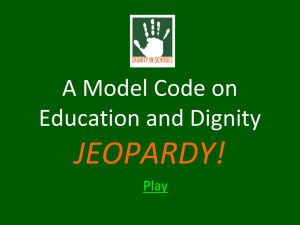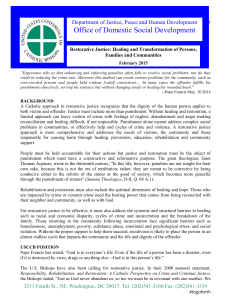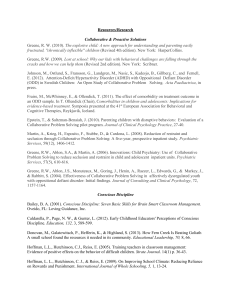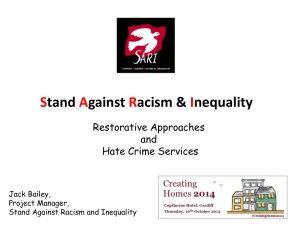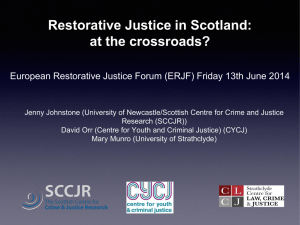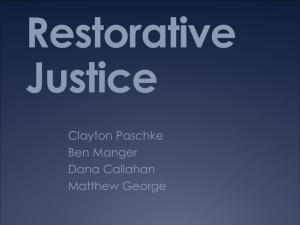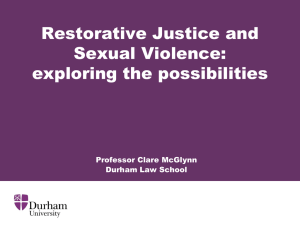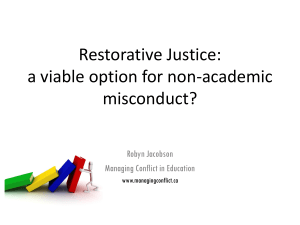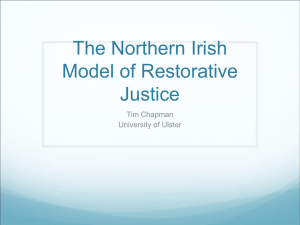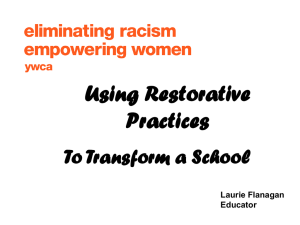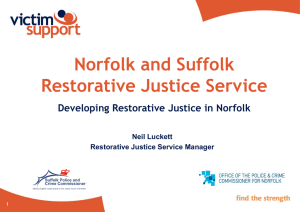Title should go here - Centre for Youth & Criminal Justice
advertisement
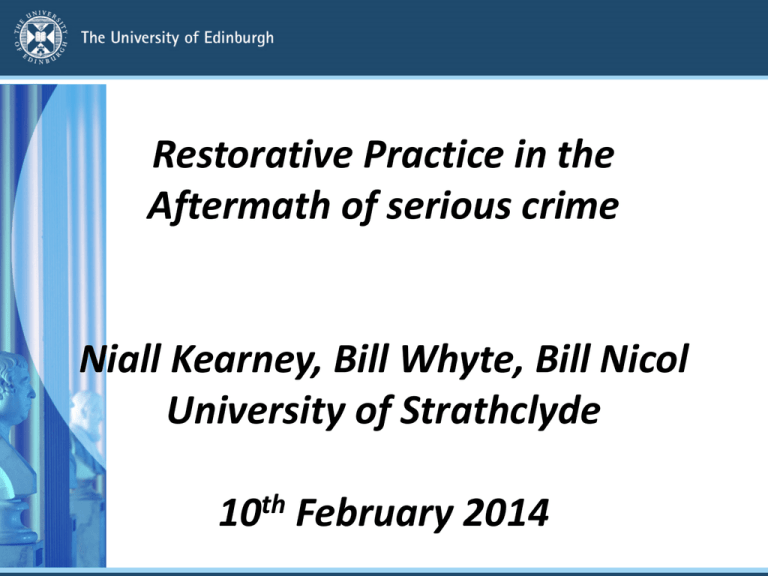
Restorative Practice in the Aftermath of serious crime Niall Kearney, Bill Whyte, Bill Nicol University of Strathclyde 10th February 2014 Learning through doing Shaping a restorative practice model through Restoration in Serious Crime (RISC) Bill Whyte Professor of Social Work Studies in Criminal and Youth Justice Support for Restorative Practice widespread across western jurisdictions –but is it Restorative Justice ? evidence of (a new paradigm) different kind of justice? is the term RJ discredited? scripted commodification, focus on minor offences; limited provision for victims practice disconnected from wider services long term impact What should the intended ‘purpose’ of restorative practices be? Peacemaking? Indigenous approaches Assythment (Scotland 15th Century- 1974) satisfaction ..indemnification demandable by the family of a person injured or slain the recompense or redress made for wrongs or damage committed -avoid blood feuding, making peace - community safety and social wellbeing? A Social Movement Full of Opportunities and Pitfalls (Umbreit et al 2012) principles and practices not inherently benign or incapable of doing harm. pitfalls derive from the inherent difficulty of attempting to balance ..valid needs: of victims, of offenders, of the community, and ultimately of the state small programmes ..may be less prone to such errors than large institutions and governments Towards a practice model A single case study – Sacro, Police, Victim Support, UoE (funded by SG) Car FatalityAcquaintances from same small town One young man dead One young man (with no previous) convicted & imprisoned Two Families damaged – one irreparably Community of interest vengeful The Justice system has run its course? contact communities of interest engagement timing preparation objectives outcomes skills set strategic context/framework practice model Shaping a Model What is the rationale for Restoration in Serious Crime? How did we go about it? What are we learning? Shaping a Model Niall Kearney Shaping a Model What is the rationale for Restoration in Serious Crime? How did we go about it? What are we learning? Rationale Restorative practices in justice are best applied where there is significant harm, that is, violent crime. RISC (restoration in serious crime) an action research project contains the seeds of a positive way forward for restorative practice directs resources to high tariff cases where the need is greatest, draws on the ancient Scots legal principle of assythment and peacemaking has the potential to set Scotland at the forefront of restorative practice developments worldwide. Rationale Restorative practices in justice are best applied where there is significant harm, that is, violent crime. RISC (restoration in serious crime) an action research project contains the seeds of a positive way forward for restorative practice directs resources to high tariff cases where the need is greatest, draws on the ancient Scots legal principle of assythment and peacemaking has the potential to set Scotland at the forefront of restorative practice developments worldwide. Rationale “ ‘ To hear of the effect of the death of their eldest child on his parents, would draw tears from stone. Even more moving, was their heartfelt and tearful plea, made in Court, that you, who have been like a brother to their son, and in some ways like a son to them, not be imprisoned. For them that would be a second tragedy on top of the first, and would achieve nothing.’ “ Judge David Carruthers, New Zealand Going about it A young driver was sentenced to 30 months imprisonment for causing the death his passenger by crashing at high speed. 1 Develop appropriate outreach 2 Provide an intervention 3 Develop a practice model What are we learning? Outreach is possible with clear support from Police, Scottish Prison Service, Health, Social Work and Vol Orgs Training is essential Ripple effect No hype! Where Next? Tiered or Graduated model Mediation, restorative meetings Testing Preparation Back up service provision Individual, group meetings Sacro Billy Nicol • Sacro experienced in restorative justice • Sacro experience of Talking After Serious Crime but keen to develop outreach model along with partners • Still learning through doing Sacro • Experience/future • Training • Risk assessment and management • Support and supervision of staff
